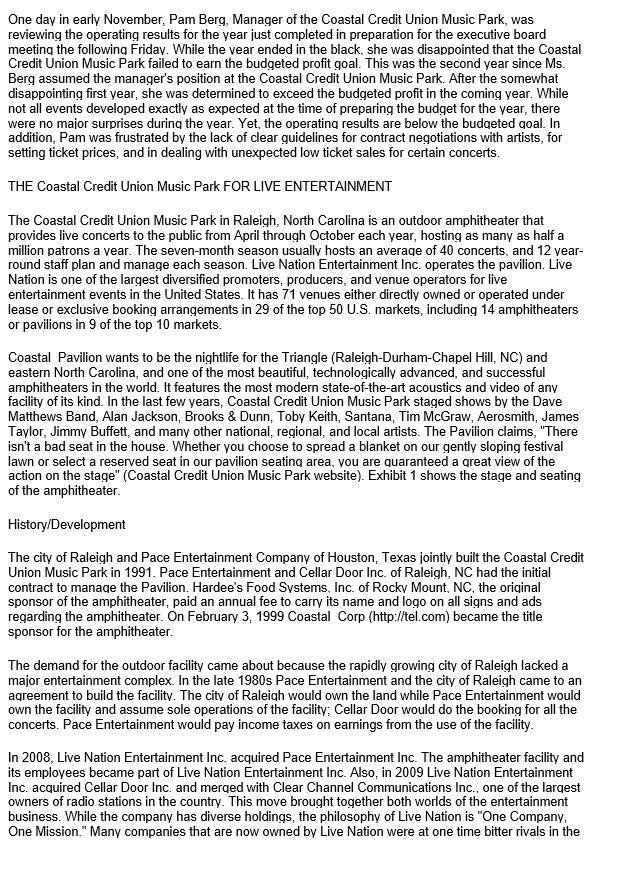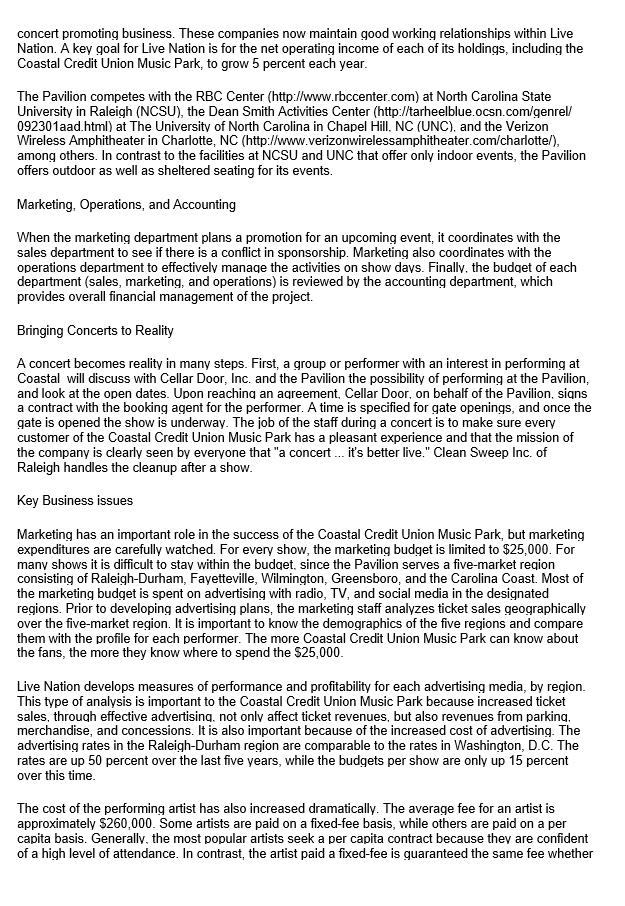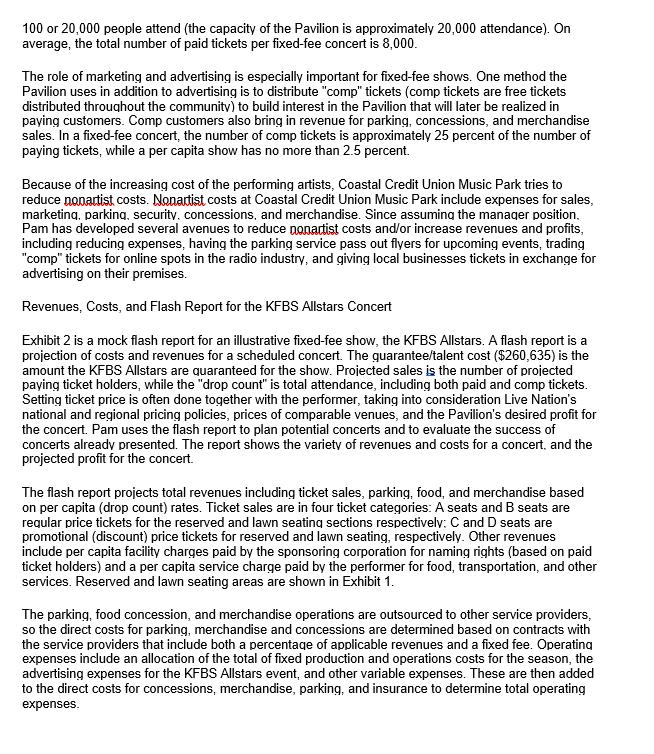Question
Negotiating the fee for the KFBS Allstars: fixed-pay or per capita contracts: a) What is the maximum fixed fee that the Pavilion can pay the



Negotiating the fee for the KFBS Allstars: fixed-pay or per capita contracts:
a) What is the maximum fixed fee that the Pavilion can pay the KFBS Allstars if the Pavilion wants to earn $45,000 after 20 percent tax and expects the show to have an average ticket price of $36.29? Assume the show is expected to draw 7,000 paying ticket holders.
b) What is the maximum fixed fee that the Pavilion can pay the KFBS Allstars if the Pavilion wants to earn $45,000 after 20 percent tax and expects the show to have an average ticket price of $36.29? Assume, including 25 percent comp tickets, the show is expected to be a sell-out.
c) Independent of (a) and (b), what is the maximum per capita fee that the Pavilion can pay the KFBS Allstars, whose concert is expected to be a sellout, if the Pavilion wants to earn $ 180,000 after 20 percent tax from an average ticket price of $33 per ticket? (zero comp tickets can be assumed)
One day in early November, Pam Berg, Manager of the Coastal Credit Union Music Park, was reviewing the operating results for the year just completed in preparation for the executive board meeting the following Friday. While the year ended in the black, she was disappointed that the Coastal Credit Union Music Park failed to earn the budgeted profit goal. This was the second year since Ms. Berg assumed the manager's position at the Coastal Credit Union Music Park. After the somewhat disappointing first year, she was determined to exceed the budgeted profit in the coming year. While not all events developed exactly as expected at the time of preparing the budget for the year, there were no major surprises during the year. Yet, the operating results are below the budgeted goal. In addition, Pam was frustrated by the lack of clear guidelines for contract negotiations with artists, for setting ticket prices, and in dealing with unexpected low ticket sales for certain concerts. THE Coastal Credit Union Music Park FOR LIVE ENTERTAINMENT The Coastal Credit Union Music Park in Raleigh, North Carolina is an outdoor amphitheater that provides live concerts to the public from April through October each year, hosting as many as half a million patrons a year. The seven-month season usually hosts an average of 40 concerts, and 12 year- round staff plan and manage each season. Live Nation Entertainment Inc. operates the pavilion. Live Nation is one of the largest diversified promoters, producers, and venue operators for live entertainment events in the United States. It has 71 venues either directly owned or operated under lease or exclusive booking arrangements in 29 of the top 50 U.S. markets, including 14 amphitheaters or pavilions in 9 of the top 10 markets. Coastal Pavilion wants to be the nightlife for the Triangle (Raleigh-Durham-Chapel Hill, NC) and eastern North Carolina, and one of the most beautiful, technologically advanced, and successful amphitheaters in the world. It features the most modern state-of-the-art acoustics and video of any facility of its kind. In the last few years, Coastal Credit Union Music Park staged shows by the Dave Matthews Band, Alan Jackson, Brooks & Dunn, Toby Keith, Santana, Tim McGraw, Aerosmith, James Taylor, Jimmy Buffett, and many other national, regional, and local artists. The Pavilion claims, "There isn't a bad seat in the house. Whether you choose to spread a blanket on our gently sloping festival lawn or select a reserved seat in our pavilion seating area, you are quaranteed a great view of the action on the stage" (Coastal Credit Union Music Park website). Exhibit 1 shows the stage and seating of the amphitheater. History/Development The city of Raleigh and Pace Entertainment Company of Houston, Texas jointly built the Coastal Credit Union Music Park in 1991. Pace Entertainment and Cellar Door Inc. of Raleigh, NC had the initial contract to manage the Pavilion. Hardee's Food Systems, Inc. of Rocky Mount, NC, the original sponsor of the amphitheater, paid an annual fee to carry its name and logo on all signs and ads regarding the amphitheater. On February 3, 1999 Coastal Corp (http://tel.com) became the title sponsor for the amphitheater. The demand for the outdoor facility came about because the rapidly growing city of Raleigh lacked a major entertainment complex. In the late 1980s Pace Entertainment and the city of Raleigh came to an agreement to build the facility. The city of Raleigh would own the land while Pace Entertainment would own the facility and assume sole operations of the facility; Cellar Door would do the booking for all the concerts. Pace Entertainment would pay income taxes on earnings from the use of the facility. In 2008, Live Nation Entertainment Inc. acquired Pace Entertainment Inc. The amphitheater facility and its employees became part of Live Nation Entertainment Inc. Also, in 2009 Live Nation Entertainment Inc. acquired Cellar Door Inc. and merged with Clear Channel Communications Inc., one of the largest owners of radio stations in the country. This move brought together both worlds of the entertainment business. While the company has diverse holdings, the philosophy of Live Nation is "One Company, One Mission." Many companies that are now owned by Live Nation were at one time bitter rivals in the
Step by Step Solution
3.45 Rating (158 Votes )
There are 3 Steps involved in it
Step: 1
a The maximum fee the Pavilion can pay the K F BS All stars is 220 000 To calculate the maximum fee we need to know the following information Total ti...
Get Instant Access to Expert-Tailored Solutions
See step-by-step solutions with expert insights and AI powered tools for academic success
Step: 2

Step: 3

Ace Your Homework with AI
Get the answers you need in no time with our AI-driven, step-by-step assistance
Get Started


